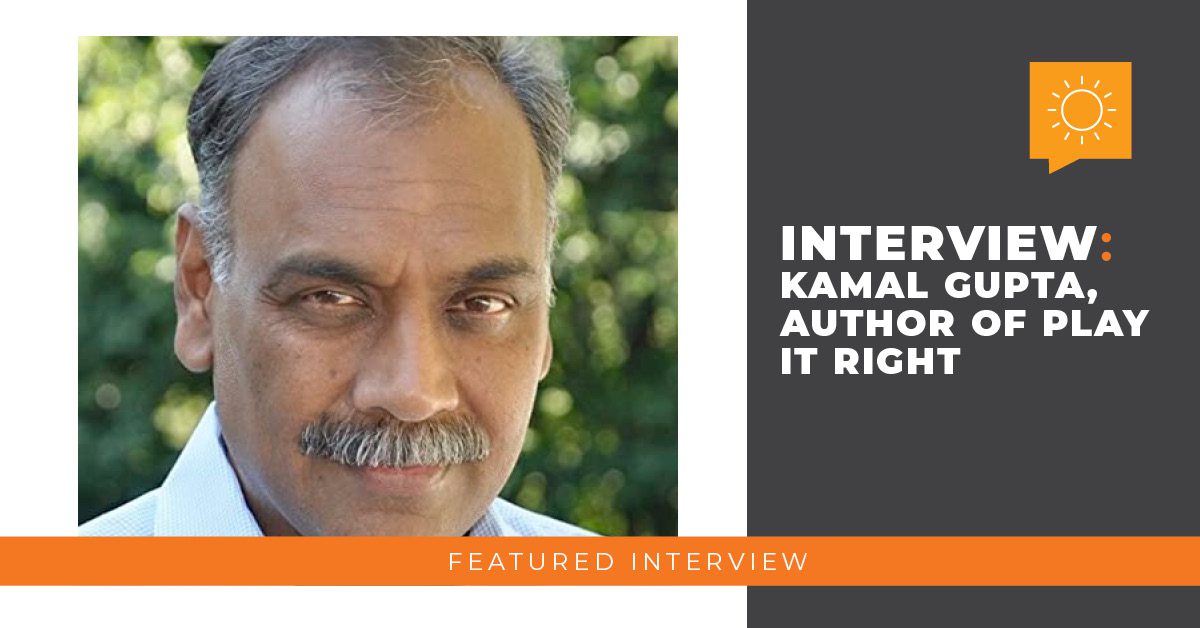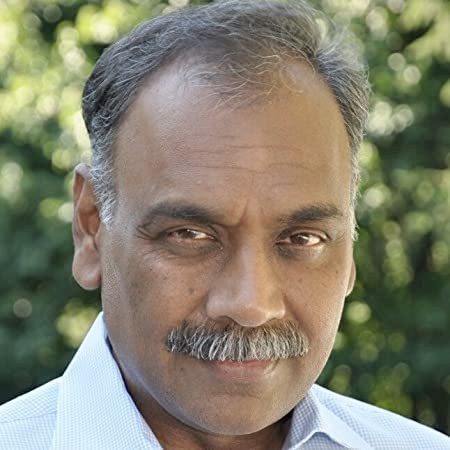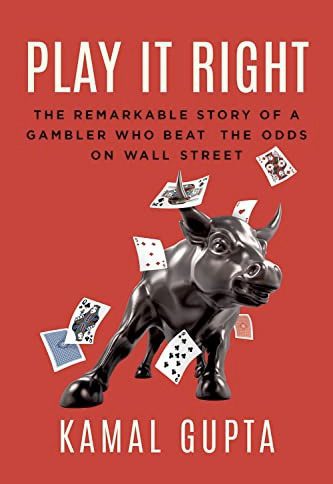By Michele Mathews

In May, Kamal Gupta released Play It Right, a memoir that chronicles his journey from India to America, from computers to gambling, culminating in a quarter-century career on Wall Street. I had the chance to learn more about him and his debut book.
You’re originally from India. What was it like immigrating to America?
KG: I had grown up in India during the 1970s, which was an especially turbulent time. Consequently, to me, America seemed like a mythical place where anything was possible. I still remember landing at JFK Airport in August of 1985, peering out of the window of a British Airways jumbo jet and being filled with hope and anticipation.
Despite that sense of optimism, I found my adjustment to be somewhat difficult. I had migrated from New Delhi, where winter temperatures bottomed out at 40 degrees, to Madison, Wisconsin, where I would experience wind chills of 70 below zero. A late night encounter with a fire alarm made me feel particularly foolish —I had mistaken it for a large bee trapped inside my oven. Food proved to be another challenge. I was a vegetarian (still am) and grocery stores in America’s dairyland weren’t all that hospitable towards an Indian who didn’t eat meat or cheese.
Two things struck me about America when I first arrived. One, anyone could attain a decent standard of living as long as they were willing to work hard — an idea that was miles removed from the prevailing economic climate of India. And two, there was a level of trust between merchants and consumers that I found remarkable. You could put a quarter into a newspaper kiosk and take as many newspapers as you wanted. (I only ever took one.) If you weren’t happy with an item bought from a store, you could simply return it for a full refund, another truly foreign idea.
Your educational background is electrical engineering and computer science. What made you decide to become a professional blackjack player?
KG: I realized early on that I had no interest in spending the rest of my life sitting in a cubicle and punching on a keyboard all day long. As a result, I was always on the lookout for a distraction from the tedium of my computer job.
I spent a great deal of time playing a Tetris-like video game in the office and shooting pool in smoke-filled bars after work. I took up sailing and bought a sailboat. In my search for an alternate career, I even moonlighted as a waiter in a Middle Eastern restaurant. A handful of years later, on a weekend ski trip to Lake Tahoe, I encountered the game that would change my life.
I was fascinated by the simplicity of blackjack — get as close to 21 as possible without going over. And when I discovered that counting cards could turn the odds in the player’s favor, I was hooked. The game was the perfect combination of three things I cared deeply about: numbers, taking calculated risks, and fighting against unfairness. I found it extremely unjust that casinos threw skilled blackjack players out, a fate that I would suffer myself on several occasions. I decided to become a professional blackjack player, if for no other reason than to teach the casinos a lesson.
Play it Right is your first book. Describe your writing experience.
KG: Before I started working on Play It Right, I had never written so much as a one page article. However, I had a great deal of experience as a storyteller, albeit only verbally. It was a challenge to translate that skill into writing that could not only be understood by anybody, but would also appeal to them. I read several books on how to write creative non-fiction. It took me a while, but I figured out that writing is a craft and that, with practice, anyone can become a competent writer. I also had a great deal of help with the editing of my early drafts, some of which were truly awful.
I write strictly between the hours of 4 and 8 a.m. because of the silence offered by the early morning. Writing can be a frustrating experience. Sometimes I was able to write an entire chapter in one day, and at other times, I found myself deliberating over one sentence for days. The most satisfying aspect of writing is the feeling you get when you nail the story as well as the language. You just know when it is right.
Why did you decide to write this memoir?
KG: I decided to write Play It Right simply because I had a story to tell —a bored computer scientist transforms himself into a professional blackjack player, parlays his gambling skills into a job on Wall Street, and embarks on a quarter-century odyssey into the world of high finance.
What made my story unique was the fact that, in addition to my being an Indian immigrant, I had never pursued any of my vocations for money. In casinos as well as on Wall Street, I was driven solely by the desire to play the game well. I have always considered money to be merely a side effect of a game played well, a lesson that is sorely needed in today’s world. The myriad of problems that America faces today as well as the 2008 financial crisis can be blamed upon a quarter century of unbridled greed. The notion of “the game” has been lost in a relentless thirst for more and more money. My goal in Play It Right is to put the focus back where it belongs.
In your book, you say, “Wall Street of the eighties appeared to be a den of thieves…” Could you explain what you mean by that?
KG: In the 1987 movie, Wall Street, Michael Douglas’s character famously said, “Greed is good.” Far from being impressed, I was appalled by that line. I have always considered greed to be the root of evil.
Two of the most prominent practitioners of the greed is good principle, Ivan Boesky and Michael Milken, both earned significant jail terms for their offenses. Hence, I became convinced that the financial industry was a den of thieves and even took a vow to never work on Wall Street. Needless to say, I ended up breaking that promise.
Are you still working on Wall Street? If not, what are you doing?
KG: In 2018, I was involved in raising money for the largest hedge fund launch in history. When ExodusPoint Capital opened its doors in June of that year with a whopping eight billion dollars under management, I knew that I had the perfect ending to my Wall Street story. I began working on Play It Right shortly thereafter and left the financial industry for good the following year.
Right now, I am working on another non-fiction book. I have also signed a film/TV deal for a screen adaptation of Play It Right. If all goes according to plan, there might be a movie or a television series based on the book somewhere down the line.
You stated, “All of life is a gamble,” in an article. Explain what you mean by that.
KG: Life is a game of probabilities, which, by definition, turns it into a gamble. Moreover, every aspect of life carries with it some form of risk along with potential reward, just like gambling. Every decision in life, from the smallest to the most consequential, requires an assessment of that risk/reward equation. Whether you are picking out a melon in a supermarket or picking out a spouse, you are gambling with your future.
Instead of relying upon or blaming luck, I have consistently tried to turn the odds in my favor through careful analysis and hard work. This principle has stood me in good stead throughout my life.
You’re working on a second book about being a negotiator. When will you be releasing this book? Could you share some details about it, including a brief description of what a negotiator does?
KG: The book is in its early stages, and I have no idea when (or if) it might be released. I consider myself very fortunate to have published a memoir despite being a complete unknown without any writing experience. A second book would be icing on the cake.
The book is about my adventures as a behind-the-scenes negotiator. I strongly believe that the playing field today is tilted in favor of big business and against individuals. I have tried to combat this unfairness by helping scores of individuals negotiate against their corporate nemeses.
Negotiating is a game of imperfect information. You know the cards you hold and the terms that you are willing to accept. But you have no idea about your opponent’s hand or the terms that they might be willing to accept. Much like a professional poker player, a savvy negotiator determines the other side’s cards from their moves and from their words. At the same time, his own moves are designed so as to not betray the strength (or weakness) of his hand. This allows him to maximize his advantage and extract the best possible terms. There are many who find bargaining distasteful and consider it beneath their dignity. In my opinion, these people either have too much money or too little appreciation for the game. I consider negotiating to not only be a great game but also a just cause. Nothing gives me greater satisfaction than outwitting a powerful corporation and securing a great deal for someone.

About the Author
Kamal Gupta is the author of Play It Right, a memoir that chronicles his journey from India to America, from computers to gambling, culminating in a quarter-century career on Wall Street.

Play It Right
A real-life underdog tale of one man turning the tables on the casinos and Wall Street without selling his soul to the devil.
All around the world, the words “Wall Street” conjure up a powerful image. For some, it is the center of America’s capitalist system and the engine of its economic growth. For others, it is the home of rapacious bankers and reckless traders whose greed would lead to a global financial crisis. For an Indian-born blackjack player, Wall Street represented something else entirely – a chance for him to play in the largest casino in the world.
Kamal Gupta’s improbable journey, from a wide-eyed Indian immigrant to an ultimate insider in the rarefied world of investment banks and hedge funds, is a uniquely American story. Nowhere else would it have been possible for a scrawny computer scientist to enter the world of high finance solely on the basis of his gambling abilities. After spending seven years creating an investment methodology, Gupta went on an incredible run, generating an unprecedented 103 consecutive months of positive returns while managing money at large hedge funds. His success did not go unnoticed, and he found himself under constant pressure to take bigger risks to make even more money. He refused and always played it right, knowing that there was such a thing as “enough” money, something very few, if any, of his Wall Street peers understood.
Much like Maria Konnikova’s bestseller, The Biggest Bluff, Play It Right isn’t so much about money as it is about the human condition and beating the odds, whether at a casino, on Wall Street, or in life itself.
